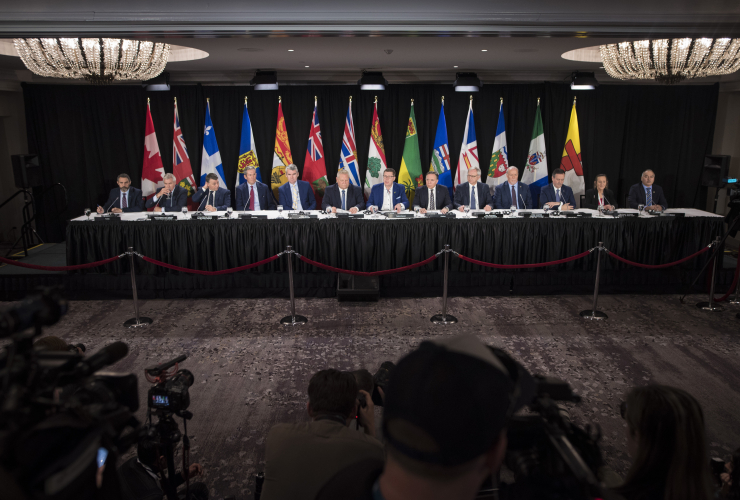Prime Minister Justin Trudeau and his cabinet are in Vancouver on Monday for the start of a three-day retreat as they prepare for an autumn session of Parliament, a new Conservative leader and the ongoing pressures of the COVID-19 recovery and inflation. .
Trudeau has indicated that affordability will be a key item on the agenda as Canadians struggle to pay their bills and inflation continues to attack bank accounts with a wrecking ball.
Last week, Trudeau said Canada’s economy has recovered quickly from the COVID-19 shutdowns and unemployment is at a record low (4.9 per cent in both June and July), but more help is to come. .
“A lot of people have jobs, but there are still real challenges and we will continue to do whatever it takes to support vulnerable Canadians as we move forward, keeping inflation in mind, but also being careful not to do things that will accelerate or deepen the inflation crisis.” we are facing,” he said last Wednesday.
That low unemployment rate is indicative of one of the biggest challenges facing the Canadian economy right now: a labor shortage.
Tim Barber, director of Bluesky Strategy Group, said Liberals would do well to use this recall to respond to ongoing labor challenges, which affect everything from manufacturing plants and restaurant kitchens to school buses and emergency rooms.
“I’d say it’s the source of a lot of our weaknesses,” Barber said.
what people are reading

Liberals have been reluctant to put more money on the table to help affordability, fearing that the grants will spur more consumer spending and demand, exacerbating price pressures.
Trudeau and Finance Minister Chrystia Freeland have so far signaled increases in government benefits that were scheduled to occur with or without inflation. That includes planned increases for Canada’s child benefit, GST refunds and senior benefits.
Most other G7 nations moved in the spring to tackle rising energy costs with outright price rebates or plans to hand out energy-related relief checks. Some Canadian provinces have followed suit: Alberta, Ontario and Newfoundland and Labrador cut gas taxes, while Saskatchewan promises $500 to every adult this fall.
@liberal_party cabinet meeting in #Vancouver, looking to regroup ahead of fall session. #CDNPoli
The federal government is not moving to lower gasoline taxes, which would contradict its climate plan that will see gasoline prices slowly rise as a way to incentivize greener energy options.
NDP leader Jagmeet Singh lobbied the government over the spring and summer to increase GST refund and child tax benefit checks to help those who need it most.
Inflation has been one of the key talking points for Pierre Poilievre, the Ottawa-area MP who is expected to run off with the Conservative leadership next weekend.
Poilievre consistently blames Trudeau squarely for the rising cost of basic needs, from housing and home heating bills, to groceries and back-to-school supplies.
Cabinet meetings are sure to include talk of how the government will respond to a Poilievre-led conservative party.
It will also be a time to consider honoring the deal made with the NDP last year in exchange for that party’s confidence-building support. To live up to the deal, the Liberals must deliver the start of a national dental care plan and a boost to housing subsidies before the end of this year.
Barber said the cabinet must be better at managing its files and must “demonstrate competence”.
This summer was the most normal since COVID-19 began, but the two-year exit from the pandemic brought a series of problems that the Liberals did not fully anticipate. That included a debacle of passport renewals and painfully long lines at airports, as neither airlines nor government-run border and security services were sufficiently staffed for a surge in travel.
There is also a growing health care crisis, largely created by labor shortages but exacerbated by ongoing pressures and burnout from COVID-19.
The provinces want more federal money for health care, and Trudeau has said repeatedly over the past two years that he would negotiate a new health deal with the provinces once the pandemic was over. But he insists any additional money must be met with specific deliverables, while the provinces want it with no strings attached.
Trudeau insists there is no dead end and that the federal government will be there with money as soon as the provinces are ready to show results.
“Canadians need better access to family doctors, Canadians need shorter wait times for surgeries, for mental health supports,” he said.
“We will be there with more investment in health care, but we must be able to show Canadians that those results will be delivered to them in a tangible way.”
The ministers are also expected to have some intense talks about their own security amid an increase in threats and acts of intimidation both online and in person against politicians.
This report from The Canadian Press was first published on September 6, 2022.
